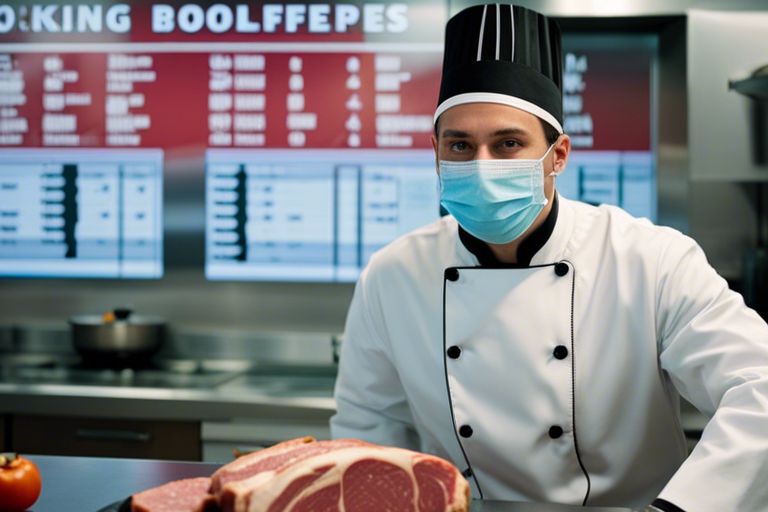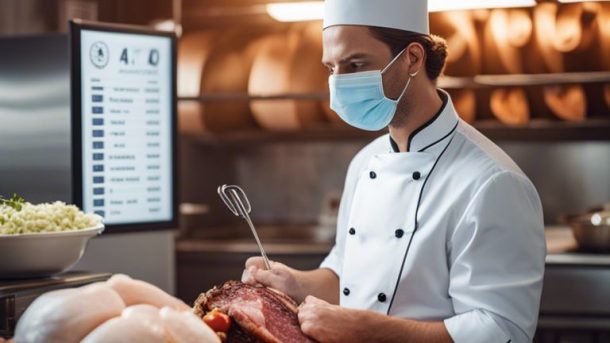It’s important to know what usually kills food poisoning so you can protect yourself and your loved ones. Understanding the sources and methods that eliminate harmful bacteria in your food can prevent dangerous illness outbreaks. Let’s explore the key factors that can help you stay safe and enjoy your meals without the risk of food poisoning.

Key Takeaways:
- Cooking: Properly cooking food kills most bacteria, viruses, and parasites that cause food poisoning.
- Refrigeration: Keeping food at the right temperature (below 40°F or 5°C) slows down the growth of bacteria, preventing them from multiplying and causing food poisoning.
- Proper Hygiene: Washing hands, utensils, and surfaces that come into contact with raw food can prevent the spread of bacteria that cause food poisoning.
Causes of Food Poisoning
Before we discuss what usually kills food poisoning, it’s vital to understand the various causes of food poisoning. One common cause is bacterial contamination.
Bacterial Contamination
Contamination of food with bacteria such as Salmonella, E. coli, and Campylobacter can lead to food poisoning. These bacteria can multiply rapidly in food that is improperly stored or cooked. Consuming contaminated food can result in symptoms such as nausea, vomiting, diarrhea, and fever.
Viral Infections
With viral infections, viruses like Norovirus and Hepatitis A can contaminate food and cause food poisoning. These viruses are highly contagious and can spread quickly in settings where food is prepared or handled. For instance, improper handwashing by food handlers can transfer viruses to food, leading to illness.
Parasitic Infestations
One of the less common causes of food poisoning is parasitic infestations. Parasites like Giardia and Cryptosporidium can contaminate food and water sources, causing illness when ingested. Symptoms of parasitic infestations can include prolonged diarrhea, stomach cramps, and weight loss.
Viral contamination of food can also occur through contact with infected food handlers or contaminated water sources.
The Role of Hygiene
There’s no denying the crucial role that hygiene plays in preventing food poisoning. By following proper hygiene practices in food preparation, storage, and handling, you can significantly reduce the risk of contamination and illness.
Hand Washing
Any time you are handling food, it is imperative to wash your hands thoroughly with soap and water. This simple yet effective practice can help prevent the spread of harmful bacteria and viruses that can cause food poisoning.
Cleanliness in Food Preparation
Hand in hand with hand washing is maintaining cleanliness in your food preparation area. This includes regularly sanitizing surfaces, cutting boards, and utensils to avoid cross-contamination. By keeping your workspace clean, you can minimize the risk of harmful pathogens making their way into your meals.
A clutter-free and organized kitchen also helps in preventing mistakes and accidental contamination. Make sure to clean up spills promptly and discard any food that may have come into contact with raw meat or poultry.
Proper Storage and Handling
One of the key aspects of preventing food poisoning is proper storage and handling of perishable items. This includes storing raw meats on the bottom shelf of the refrigerator to prevent juices from dripping onto other foods and causing contamination.
For instance, make sure to keep hot foods hot (above 140°F) and cold foods cold (below 40°F) to inhibit the growth of bacteria. When thawing frozen foods, do so in the refrigerator or under cold running water to avoid the risk of bacterial growth at room temperature.
The Importance of Cooking
Once again, cooking plays a crucial role in killing food poisoning bacteria and ensuring that your meals are safe to consume. The process of cooking involves applying heat to food, which helps eliminate harmful pathogens that can cause illness.
Heat Treatment
The heat from cooking destroys bacteria by altering their proteins and DNA, rendering them unable to cause infections. Heat treatment is necessary in making sure that your food is free from harmful microorganisms.
Cooking Temperatures
Importance
It is vital to ensure that your food reaches the proper cooking temperatures to guarantee that all bacteria are killed. Cooking temperatures can vary depending on the type of food you are preparing. Here is a table outlining the recommended cooking temperatures for various foods:
| Food | Cooking Temperature |
| Poultry (e.g., chicken, turkey) | 165°F (73.9°C) |
| Ground meats (e.g., beef, pork) | 160°F (71.1°C) |
| Seafood | 145°F (62.8°C) |
Heat
Avoiding Cross-Contamination
Heat plays a significant role in preventing cross-contamination, which can occur when harmful bacteria from raw food come into contact with cooked or ready-to-eat foods. By using separate cutting boards, utensils, and plates for raw and cooked foods, you can lower the risk of cross-contamination in your kitchen.
This extra precaution can help ensure that bacteria from raw foods do not contaminate cooked meals, keeping you and your loved ones safe from food poisoning. Remember to clean and sanitize your kitchen tools and surfaces regularly to minimize the chances of cross-contamination occurring.
The Dangers of Raw or Undercooked Foods
After learning how to treat food poisoning, one of the most crucial steps to avoid getting sick is to be mindful of raw or undercooked foods. Consuming undercooked meat, poultry, seafood, fish, eggs, and dairy products can significantly increase your risk of foodborne illnesses.
Meat and Poultry
Undercooked meat and poultry, such as rare burgers or pink chicken, can harbor harmful bacteria like Salmonella and E. coli. These pathogens can cause severe food poisoning symptoms, including nausea, vomiting, diarrhea, and stomach cramps. To reduce your risk of getting sick, always make sure that meat and poultry are cooked to the recommended internal temperatures.
Seafood and Fish
The consumption of raw or undercooked seafood and fish, such as sushi or rare fish fillets, can expose you to parasites and bacteria like Vibrio and Norovirus. These contaminants can lead to food poisoning symptoms like gastrointestinal distress and dehydration. It’s necessary to ensure that seafood and fish are cooked thoroughly to kill any harmful organisms.
Foods containing raw or undercooked eggs, such as homemade Caesar dressing or raw cookie dough, can pose a risk of Salmonella infection. Similarly, unpasteurized dairy products like raw milk or soft cheeses made from unpasteurized milk can also harbor dangerous bacteria like Listeria and Campylobacter. It’s crucial to consume pasteurized dairy products and thoroughly cook eggs to minimize the risk of foodborne illnesses.
Eggs and Dairy Products
An important tip to remember when handling eggs and dairy products is to always refrigerate them promptly and avoid consuming dishes that contain raw or undercooked eggs. Additionally, opt for pasteurized dairy products to reduce the risk of bacterial contamination.
For instance, when preparing homemade mayonnaise or eggnog, use pasteurized eggs or egg products to minimize the risk of Salmonella infection. By practicing proper food safety habits and cooking techniques, you can protect yourself from the dangers of raw or undercooked foods and decrease the likelihood of experiencing food poisoning symptoms.
The Impact of Food Handling and Storage
Temperature Control
Not maintaining proper temperature control when handling and storing food can lead to the growth of harmful bacteria that cause food poisoning. It is crucial to keep perishable foods out of the temperature danger zone, which is between 40°F and 140°F (4°C and 60°C).
| Above 140°F (60°C) | Bacteria can multiply rapidly |
| Below 40°F (4°C) | Slows down bacterial growth |
Preventing Moisture Accumulation
Storage: Control moisture levels in your fridge and storage areas to prevent excess condensation, which can create an environment for bacterial growth.
Control: Wipe down wet surfaces in your fridge, dry food containers before storing, and use airtight bags or containers to prevent moisture accumulation.
Labeling and Date Management
The handling and storage of food can be improved by proper labeling and date management. Labeling items with dates of purchase or expiration can help you track when to use or discard them, reducing the risk of consuming spoiled food.
Handling: Regularly check the dates on food items in your fridge and pantry. Rotate items so older ones are used first, and properly dispose of expired products to maintain food safety.
To ensure the safety of the food you consume, it is crucial to pay attention to proper temperature control, prevent moisture accumulation, and manage labeling and dates effectively. By following these guidelines, you can reduce the risk of food poisoning and promote a healthier and safer food handling and storage environment in your home.

Personal Factors Affecting Susceptibility
Unlike some health issues that can affect anyone regardless of age or health status, food poisoning can be influenced by several personal factors that determine your susceptibility to it.
Age and Immune System
Immune system strength plays a significant role in how your body fights off infections, including those caused by food poisoning. As you age, your immune system may weaken, making you more susceptible to foodborne illnesses. Children, especially babies and toddlers, also have developing immune systems that may not be as effective at fighting off harmful bacteria compared to adults.
This difference in immune system strength means that older adults and young children are more vulnerable to the severe effects of food poisoning. This vulnerability highlights the importance of handling and preparing food safely, especially when cooking for these age groups.
Pre-Existing Medical Conditions
To further complicate matters, pre-existing medical conditions can also impact your susceptibility to food poisoning. If you have conditions that weaken your immune system, such as HIV/AIDS or diabetes, you may be at a higher risk of developing severe symptoms if you contract a foodborne illness.
The presence of pre-existing medical conditions can make it more challenging for your body to fight off foodborne pathogens, increasing the likelihood of complications or prolonged illness. It’s crucial to take extra precautions when handling and consuming food if you have underlying health issues to reduce your risk of food poisoning.
Medication and Nutritional Deficiencies
Susceptibility to food poisoning can also be affected by the medications you are taking and any nutritional deficiencies you may have. Certain medications, such as antibiotics or steroids, can weaken your immune system, making it harder for your body to fend off harmful bacteria from contaminated food.
Affecting your body’s ability to absorb crucial nutrients, nutritional deficiencies can also impact your susceptibility to food poisoning. A lack of vitamins and minerals necessary for a healthy immune system can make you more prone to infections and illnesses, including those caused by consuming contaminated food.
Final Words
Now that you have a better understanding of what usually kills food poisoning, remember to always practice good food safety habits to prevent contamination and potential illness. By properly storing, handling, and cooking your food, you can greatly reduce the risk of food poisoning. Keep in mind that cleanliness is key in the kitchen, and always follow proper cooking temperatures to ensure that harmful bacteria are killed off.
So, next time you prepare a meal, take the necessary precautions to protect yourself and your loved ones from the dangers of food poisoning. Your attention to detail and mindfulness in the kitchen can be the difference between enjoying a delicious meal and dealing with the unpleasant consequences of foodborne illness.
FAQ
Q: What usually kills food poisoning?
A: Food poisoning is typically caused by bacteria, viruses, or parasites in contaminated food. Cooking food thoroughly can kill most of these microorganisms and prevent food poisoning. In addition, proper food handling, storage, and hygiene practices can help prevent the spread of foodborne illnesses.
Q: How can I prevent food poisoning?
A: To prevent food poisoning, follow these tips:
- Cook food to the appropriate temperatures to kill harmful bacteria.
- Wash hands, utensils, and surfaces often to prevent cross-contamination.
- Store food at the proper temperatures to slow the growth of bacteria.
- Avoid eating raw or undercooked foods, especially meat, poultry, seafood, and eggs.
- Be cautious when eating at restaurants or food establishments with questionable hygiene practices.
Q: What are the common symptoms of food poisoning?
A: The common symptoms of food poisoning include:
- Nausea
- Vomiting
- Diarrhea
- Stomach cramps
- Fever
- Headache
- Weakness
These symptoms can vary in severity depending on the type of microorganism causing the food poisoning.


